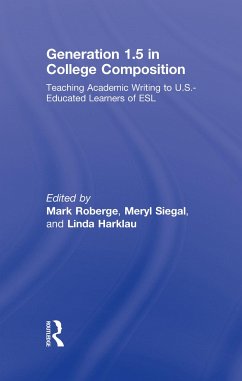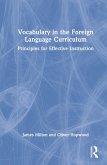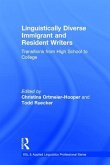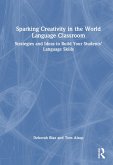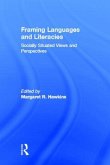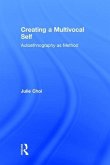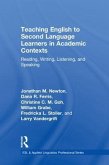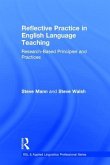Generation 1.5 in College Composition
Teaching Academic Writing to U.S.-Educated Learners of ESL
Herausgeber: Roberge, Mark; Harklau, Linda; Siegal, Meryl
Generation 1.5 in College Composition
Teaching Academic Writing to U.S.-Educated Learners of ESL
Herausgeber: Roberge, Mark; Harklau, Linda; Siegal, Meryl
- Gebundenes Buch
- Merkliste
- Auf die Merkliste
- Bewerten Bewerten
- Teilen
- Produkt teilen
- Produkterinnerung
- Produkterinnerung
Building on the work that has been done over the past decade, this volume provides theoretical frameworks for understanding debates about immigrant students, studies of students' schooling paths and language and literacy experiences, and pedagogical approaches for working with Generation 1.5 students.
Andere Kunden interessierten sich auch für
![Vocabulary in the Foreign Language Curriculum Vocabulary in the Foreign Language Curriculum]() James MiltonVocabulary in the Foreign Language Curriculum180,99 €
James MiltonVocabulary in the Foreign Language Curriculum180,99 €![Linguistically Diverse Immigrant and Resident Writers Linguistically Diverse Immigrant and Resident Writers]() Linguistically Diverse Immigrant and Resident Writers191,99 €
Linguistically Diverse Immigrant and Resident Writers191,99 €![Sparking Creativity in the World Language Classroom Sparking Creativity in the World Language Classroom]() Deborah BlazSparking Creativity in the World Language Classroom183,99 €
Deborah BlazSparking Creativity in the World Language Classroom183,99 €![Framing Languages and Literacies Framing Languages and Literacies]() Framing Languages and Literacies202,99 €
Framing Languages and Literacies202,99 €![Creating a Multivocal Self Creating a Multivocal Self]() Julie ChoiCreating a Multivocal Self215,99 €
Julie ChoiCreating a Multivocal Self215,99 €![Teaching English to Second Language Learners in Academic Contexts Teaching English to Second Language Learners in Academic Contexts]() Jonathan M NewtonTeaching English to Second Language Learners in Academic Contexts206,99 €
Jonathan M NewtonTeaching English to Second Language Learners in Academic Contexts206,99 €![Reflective Practice in English Language Teaching Reflective Practice in English Language Teaching]() Steve MannReflective Practice in English Language Teaching202,99 €
Steve MannReflective Practice in English Language Teaching202,99 €-
-
-
Building on the work that has been done over the past decade, this volume provides theoretical frameworks for understanding debates about immigrant students, studies of students' schooling paths and language and literacy experiences, and pedagogical approaches for working with Generation 1.5 students.
Hinweis: Dieser Artikel kann nur an eine deutsche Lieferadresse ausgeliefert werden.
Hinweis: Dieser Artikel kann nur an eine deutsche Lieferadresse ausgeliefert werden.
Produktdetails
- Produktdetails
- Verlag: Taylor & Francis
- Seitenzahl: 284
- Erscheinungstermin: 1. Mai 2008
- Englisch
- Abmessung: 229mm x 152mm x 18mm
- Gewicht: 549g
- ISBN-13: 9780805864427
- ISBN-10: 0805864423
- Artikelnr.: 23200723
- Herstellerkennzeichnung
- Libri GmbH
- Europaallee 1
- 36244 Bad Hersfeld
- gpsr@libri.de
- Verlag: Taylor & Francis
- Seitenzahl: 284
- Erscheinungstermin: 1. Mai 2008
- Englisch
- Abmessung: 229mm x 152mm x 18mm
- Gewicht: 549g
- ISBN-13: 9780805864427
- ISBN-10: 0805864423
- Artikelnr.: 23200723
- Herstellerkennzeichnung
- Libri GmbH
- Europaallee 1
- 36244 Bad Hersfeld
- gpsr@libri.de
Mark Roberge is Associate Professor in the Composition program at San Francisco State University. Meryl Siegal is Instructor of English at Laney College in Oakland, California. Linda Harklau is Professor in the Teaching Additional Languages program and Linguistics program at the University of Georgia.
@contents: Selected Contents
Introduction
Generation 1.5 ten years later, Mark Roberge, Meryl Siegal and Linda
Harklau
Section One: Frameworks for understanding Generation 1.5
1. Approaching Generation 1.5 through immigrant studies and
socio-political/socio-economic frameworks, Vivian Louie
2. Language minorities in higher education-What we (don't) know, Linda
Harklau
3. The complex linguistic situation of Generation 1.5 students, Mary
Schmida
4. The Erasure of Resident ESL Writers, Paul Kei Matsuda and Aya Matsuda
Section Two: Generation 1.5 student characteristics and schooling paths
1. Generation 1.5 immigrant ESL students: What experiences,
characteristics and needs might they bring to our English classes?
Mark Roberge
2. Academic reading and writing challenges and strategies used to meet
those challenges: A case of four undergraduate Generation 1.5
students, Cathryn Crosby
3. At what price success? The academic writing development of a
Generation 1.5 latecomer, Jan Frodesen
4. Generation 1.5 students and the hegemony of dominant language
ideologies, Jennifer A. Mott-Smith
5. Accessing academic literacy in college: Pathways of U.S.-educated
English language learners, Genevieve Patthey-Chavez, Joan
Thomas-Spiegel, and Paul Dillon
Section Three: Pedagogical approaches for Generation 1.5
1. Pedagogical principles and practices for working with Generation 1.5,
Patricia Porter, Deborah VanDommelen, Sugie Goen-Salter, and Deborah
Swanson
2. Reading/writing connections for Generation 1.5, Harriett Allison
3. Vocabulary and reading for Generation 1.5, Cheryl Benz
A functional focus on language: Grammar for Generation 1.5, Mary J.
Schleppegrell
1. Socioliterate pedagogy for Generation 1.5, Ann Johns
2. Charting new territory: Creating an interdepartmental writing course
for Generation 1.5, Christine Holten
3. Individualizing pedagogy: Working with diverse needs and goals in
freshman composition for international students and Generation 1.5,
Dudley Reynolds, Kyung-Hee Bae and Jennifer Shade Wilson
Situating language and academic literacy development into a
curriculum of first-year college courses for Generation 1.5, Robin
Murie
4. Promoting Generation 1.5 learners' academic literacy and autonomy:
Pedagogical approaches from the learning center, Margi Wald and
Nathalie Destandau
Conclusion
Where do we go from here? Mark Roberge, Meryl Siegal and Linda Harklau
Introduction
Generation 1.5 ten years later, Mark Roberge, Meryl Siegal and Linda
Harklau
Section One: Frameworks for understanding Generation 1.5
1. Approaching Generation 1.5 through immigrant studies and
socio-political/socio-economic frameworks, Vivian Louie
2. Language minorities in higher education-What we (don't) know, Linda
Harklau
3. The complex linguistic situation of Generation 1.5 students, Mary
Schmida
4. The Erasure of Resident ESL Writers, Paul Kei Matsuda and Aya Matsuda
Section Two: Generation 1.5 student characteristics and schooling paths
1. Generation 1.5 immigrant ESL students: What experiences,
characteristics and needs might they bring to our English classes?
Mark Roberge
2. Academic reading and writing challenges and strategies used to meet
those challenges: A case of four undergraduate Generation 1.5
students, Cathryn Crosby
3. At what price success? The academic writing development of a
Generation 1.5 latecomer, Jan Frodesen
4. Generation 1.5 students and the hegemony of dominant language
ideologies, Jennifer A. Mott-Smith
5. Accessing academic literacy in college: Pathways of U.S.-educated
English language learners, Genevieve Patthey-Chavez, Joan
Thomas-Spiegel, and Paul Dillon
Section Three: Pedagogical approaches for Generation 1.5
1. Pedagogical principles and practices for working with Generation 1.5,
Patricia Porter, Deborah VanDommelen, Sugie Goen-Salter, and Deborah
Swanson
2. Reading/writing connections for Generation 1.5, Harriett Allison
3. Vocabulary and reading for Generation 1.5, Cheryl Benz
A functional focus on language: Grammar for Generation 1.5, Mary J.
Schleppegrell
1. Socioliterate pedagogy for Generation 1.5, Ann Johns
2. Charting new territory: Creating an interdepartmental writing course
for Generation 1.5, Christine Holten
3. Individualizing pedagogy: Working with diverse needs and goals in
freshman composition for international students and Generation 1.5,
Dudley Reynolds, Kyung-Hee Bae and Jennifer Shade Wilson
Situating language and academic literacy development into a
curriculum of first-year college courses for Generation 1.5, Robin
Murie
4. Promoting Generation 1.5 learners' academic literacy and autonomy:
Pedagogical approaches from the learning center, Margi Wald and
Nathalie Destandau
Conclusion
Where do we go from here? Mark Roberge, Meryl Siegal and Linda Harklau
@contents: Selected Contents
Introduction
Generation 1.5 ten years later, Mark Roberge, Meryl Siegal and Linda
Harklau
Section One: Frameworks for understanding Generation 1.5
1. Approaching Generation 1.5 through immigrant studies and
socio-political/socio-economic frameworks, Vivian Louie
2. Language minorities in higher education-What we (don't) know, Linda
Harklau
3. The complex linguistic situation of Generation 1.5 students, Mary
Schmida
4. The Erasure of Resident ESL Writers, Paul Kei Matsuda and Aya Matsuda
Section Two: Generation 1.5 student characteristics and schooling paths
1. Generation 1.5 immigrant ESL students: What experiences,
characteristics and needs might they bring to our English classes?
Mark Roberge
2. Academic reading and writing challenges and strategies used to meet
those challenges: A case of four undergraduate Generation 1.5
students, Cathryn Crosby
3. At what price success? The academic writing development of a
Generation 1.5 latecomer, Jan Frodesen
4. Generation 1.5 students and the hegemony of dominant language
ideologies, Jennifer A. Mott-Smith
5. Accessing academic literacy in college: Pathways of U.S.-educated
English language learners, Genevieve Patthey-Chavez, Joan
Thomas-Spiegel, and Paul Dillon
Section Three: Pedagogical approaches for Generation 1.5
1. Pedagogical principles and practices for working with Generation 1.5,
Patricia Porter, Deborah VanDommelen, Sugie Goen-Salter, and Deborah
Swanson
2. Reading/writing connections for Generation 1.5, Harriett Allison
3. Vocabulary and reading for Generation 1.5, Cheryl Benz
A functional focus on language: Grammar for Generation 1.5, Mary J.
Schleppegrell
1. Socioliterate pedagogy for Generation 1.5, Ann Johns
2. Charting new territory: Creating an interdepartmental writing course
for Generation 1.5, Christine Holten
3. Individualizing pedagogy: Working with diverse needs and goals in
freshman composition for international students and Generation 1.5,
Dudley Reynolds, Kyung-Hee Bae and Jennifer Shade Wilson
Situating language and academic literacy development into a
curriculum of first-year college courses for Generation 1.5, Robin
Murie
4. Promoting Generation 1.5 learners' academic literacy and autonomy:
Pedagogical approaches from the learning center, Margi Wald and
Nathalie Destandau
Conclusion
Where do we go from here? Mark Roberge, Meryl Siegal and Linda Harklau
Introduction
Generation 1.5 ten years later, Mark Roberge, Meryl Siegal and Linda
Harklau
Section One: Frameworks for understanding Generation 1.5
1. Approaching Generation 1.5 through immigrant studies and
socio-political/socio-economic frameworks, Vivian Louie
2. Language minorities in higher education-What we (don't) know, Linda
Harklau
3. The complex linguistic situation of Generation 1.5 students, Mary
Schmida
4. The Erasure of Resident ESL Writers, Paul Kei Matsuda and Aya Matsuda
Section Two: Generation 1.5 student characteristics and schooling paths
1. Generation 1.5 immigrant ESL students: What experiences,
characteristics and needs might they bring to our English classes?
Mark Roberge
2. Academic reading and writing challenges and strategies used to meet
those challenges: A case of four undergraduate Generation 1.5
students, Cathryn Crosby
3. At what price success? The academic writing development of a
Generation 1.5 latecomer, Jan Frodesen
4. Generation 1.5 students and the hegemony of dominant language
ideologies, Jennifer A. Mott-Smith
5. Accessing academic literacy in college: Pathways of U.S.-educated
English language learners, Genevieve Patthey-Chavez, Joan
Thomas-Spiegel, and Paul Dillon
Section Three: Pedagogical approaches for Generation 1.5
1. Pedagogical principles and practices for working with Generation 1.5,
Patricia Porter, Deborah VanDommelen, Sugie Goen-Salter, and Deborah
Swanson
2. Reading/writing connections for Generation 1.5, Harriett Allison
3. Vocabulary and reading for Generation 1.5, Cheryl Benz
A functional focus on language: Grammar for Generation 1.5, Mary J.
Schleppegrell
1. Socioliterate pedagogy for Generation 1.5, Ann Johns
2. Charting new territory: Creating an interdepartmental writing course
for Generation 1.5, Christine Holten
3. Individualizing pedagogy: Working with diverse needs and goals in
freshman composition for international students and Generation 1.5,
Dudley Reynolds, Kyung-Hee Bae and Jennifer Shade Wilson
Situating language and academic literacy development into a
curriculum of first-year college courses for Generation 1.5, Robin
Murie
4. Promoting Generation 1.5 learners' academic literacy and autonomy:
Pedagogical approaches from the learning center, Margi Wald and
Nathalie Destandau
Conclusion
Where do we go from here? Mark Roberge, Meryl Siegal and Linda Harklau

